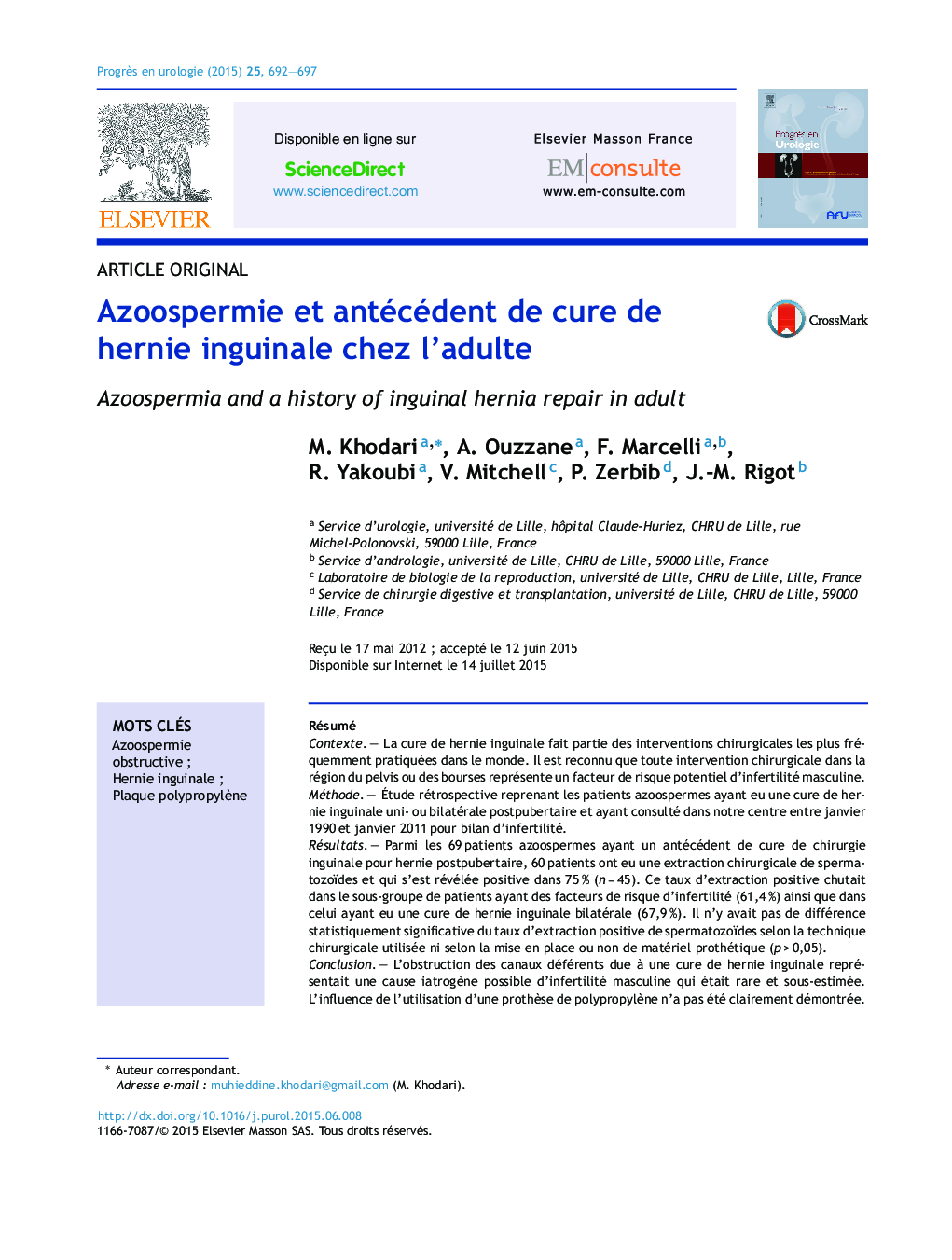| Article ID | Journal | Published Year | Pages | File Type |
|---|---|---|---|---|
| 3826288 | Progrès en Urologie | 2015 | 6 Pages |
RésuméContexteLa cure de hernie inguinale fait partie des interventions chirurgicales les plus fréquemment pratiquées dans le monde. Il est reconnu que toute intervention chirurgicale dans la région du pelvis ou des bourses représente un facteur de risque potentiel d’infertilité masculine.MéthodeÉtude rétrospective reprenant les patients azoospermes ayant eu une cure de hernie inguinale uni- ou bilatérale postpubertaire et ayant consulté dans notre centre entre janvier 1990 et janvier 2011 pour bilan d’infertilité.RésultatsParmi les 69 patients azoospermes ayant un antécédent de cure de chirurgie inguinale pour hernie postpubertaire, 60 patients ont eu une extraction chirurgicale de spermatozoïdes et qui s’est révélée positive dans 75 % (n = 45). Ce taux d’extraction positive chutait dans le sous-groupe de patients ayant des facteurs de risque d’infertilité (61,4 %) ainsi que dans celui ayant eu une cure de hernie inguinale bilatérale (67,9 %). Il n’y avait pas de différence statistiquement significative du taux d’extraction positive de spermatozoïdes selon la technique chirurgicale utilisée ni selon la mise en place ou non de matériel prothétique (p > 0,05).ConclusionL’obstruction des canaux déférents due à une cure de hernie inguinale représentait une cause iatrogène possible d’infertilité masculine qui était rare et sous-estimée. L’influence de l’utilisation d’une prothèse de polypropylène n’a pas été clairement démontrée. La prise en charge de ces patients repose sur la prévention afin de repérer les patients à risque d’infertilité et de proposer le cas échéant une cryopréservation de sperme.Niveau de preuve5.
SummaryBackgroundInguinal hernia repair is one of the most performed surgeries in the world. It is recognized that any surgery of the pelvic floor may represent a risk factor of male infertility.MethodRetrospective study of patients with azoospermia and a history of adult inguinal hernia repair surgery and referred to our center between January 1990 and January 2011 for infertility.ResultsAmong 69 azoospermia patients with history of adult inguinal hernia repair surgery, 60 patients underwent surgical extraction of sperm that was successful in 75% (45/60). Positive extraction rate decreases in the subgroup of patients with risk factors for infertility (61.4%) as well as in the group with bilateral inguinal hernia (67.9%). There was no statistically significant difference in the positive rate of sperm retrieval according to surgical technique or according to the use of polypropylene mesh (P > 0.05).ConclusionThe obstruction of the vas deferens due to an inguinal hernia repair was a potential iatrogenic cause of male infertility that was rare and underestimated. The influence of using a polypropylene mesh was not clearly demonstrated. The management of these patients is based on prevention in order to identify patients with risk factors of infertility in order to propose a presurgery cryopreservation of sperm.Level of evidence5.
